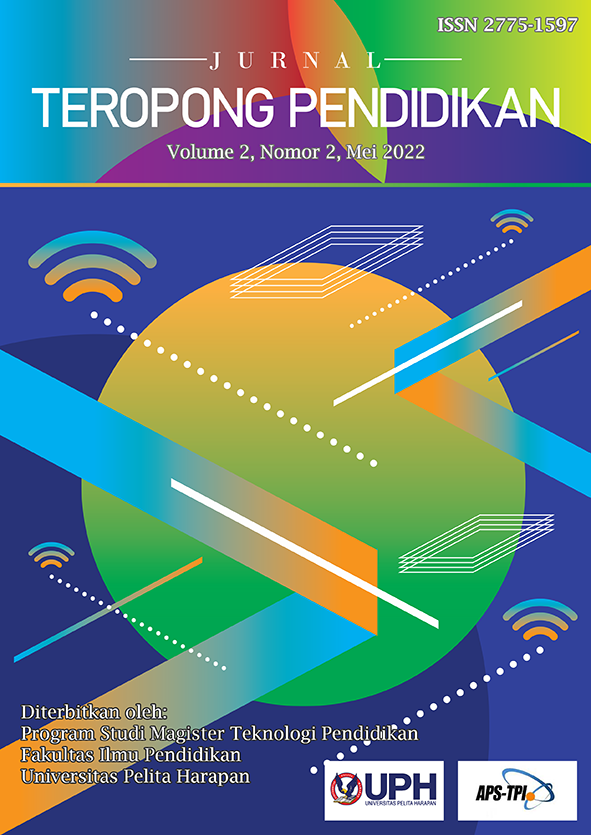Persepsi Siswa tentang Implementasi Media Literasi Digital di Pembelajaran Daring Geografi [Students' Perception about the Implementation of Digital Literacy in Geography Online Learning]
DOI:
https://doi.org/10.19166/jtp.v2i2.5790Keywords:
Students' perceptions of the implementation of digital literacy media, collaboration skills, participation, student satisfaction, cognitive learning outcomeAbstract
The background of this research is the low literacy, participation, and collaboration ability of students. The COVID-19 pandemic has had an impact on the learning process. This study aims to determine student perceptions related to the implementation of digital literacy media on participation, collaboration skills, student satisfaction, and cognitive learning achievement in geography subjects. The subjects in this study were 162 students of class XI and XII social studies at XYZ private high school in South Tangerang. This research is a quantitative descriptive study using a simple regression test to measure. Data collection techniques using a questionnaire in the form of google form. The research instrument used is a variable to measure students' perceptions about the implementation of digital literacy, participation, collaboration skills, and student satisfaction. The results showed that students' perceptions about the implementation of digital literacy media affected the participation of 38.2%. Students' perceptions of digital literacy media also affect 50.2% of collaboration skills and 64.3% of student satisfaction. Participation and collaboration ability did not show any effect on cognitive learning achievement, it was seen from the sig value. > 0.05 and Fcount. < Ftable. Cognitive learning achievement is influenced by student satisfaction and perceptions regarding digital literacy media in geography online learning by 5.4% and 2.5%, respectively. So it can be concluded that students' perceptions of digital literacy media help students learn in geography online learning.
References
Aksa, F. I., Utaya, S., & Bachri, S. (2019). Geografi dalam perspektif ilmu filsafat. Majalah Geografi Indonesia, 33(1), 43-47. https://doi.org/10.22146/mgi.35682
Anastasia, R., Amalia, A. R., & Uswatun, D. A. (2021). Analisis partisipasi siswa dalam mengikuti pembelajaran bahasa Inggris di masa pandemi Covid 19 di SDN Brawijaya. Edumaspul: Jurnal Pendidikan, 5(2), 528-534. https://doi.org/10.33487/edumaspul.v5i2.1915
Cahya, S. B. (2017). Pengaruh disiplin dan partisipasi siswa terhadap prestasi belajar melaksanakan komunikasi bisnis siswa SMK di Kecamatan Dawarblandong dengan percaya diri sebagai variabel moderasi. Jurnal Ekonomi Pendidikan Dan Kewirausahaan, 3(1), 48-60. https://doi.org/10.26740/jepk.v3n1.p48-60
Carolina, I., Supriyatna, A., & Puspitasari, D. (2020). Analisa tingkat kepuasan mahasiswa terhadap perkuliahan daring pada era pandemi Covid 19. Prosiding Seminar Nasional Riset Dan Information Science (SENARIS), 2, 342-347. https://tunasbangsa.ac.id/seminar/index.php/senaris/article/view/181
Creswell, J. W., & Creswell, J. D. (2018). Research design qualitative, quantitative, and mixed methods approaches. SAGE Publications.
Galloway, K. R., & Bretz, S. L. (2015). Development of an assessment tool to measure student meaningful learning in the undergraduate chemistry laboratory. Journal of Chemical Education, 92(7), 1149-1158. https://doi.org/10.1021/ed500881y
Gilster, P. (1997). Digital literacy. Wiley Computer Pub.
Harari, N. Y. (2018). 21 lesson for the 21st century. Penguin Random House LLC.
Hendarwati, E., Nurlaela, L., Bachri, B. S., & Sa’ida, N. (2021). Collaborative problem based learning integrated with online learning. International Journal of Emerging Technologies in Learning, 16(13), 29-39. https://doi.org/10.3991/ijet.v16i13.24159
Hutabarat, H. D. M. (2020). Analisis tingkat kepuasan mahasiswa Universitas Negeri Medan terhadap proses pembelajaran daring ditinjau dari model regresinya. Jurnal Fibonaci: Jurnal Pendidikan Matematika, 1(1), 1-8. https://jurnal.unimed.ac.id/2012/index.php/JFi/article/view/18821
Listiqowati, I., Khairurraziq., Muis, A. A., & Lisnaini. (2021). Pengaruh Edmodo terhadap peningkatan hasil belajar geografi di masa pandemi Covid 19. Geography: Jurnal Kajian Penelitian & Pengembangan Pendidikan, 9(2), 115-125. https://journal.ummat.ac.id/index.php/geography/article/view/5151
Morisson, G. R., Ross, S. M., Kemp, J. E., & Kalman, H. (2013). Designing effective instruction. John Wiley & Sons.
Nugroho, W. (2021). Kepuasan siswa terhadap pembelajaran daring menggunakan Microsoft Teams dan video Youtube Pada materi program linier. Jurnal THEOREMS (The Original Research of Mathematics), 5(2), 111-121. http://dx.doi.org/10.31949/th.v5i2.2518
Pham, T., Lai, P., Nguyen, V., & Nguyen, H. (2021). Online learning amid Covid-19 pandemic: Students’ experience and satisfaction. Journal of E-Learning and Knowledge Society, 17(1), 39-48. https://doi.org/10.20368/1971-8829/1135293
Purbawati, C., Rahmawati, L. E., Hidayah, L. N., & Wardani, L. S. P. (2020). Tingkat partisipasi siswa sekolah menengah pertama dalam pembelajaran daring di masa pandemi Covid-19. Refleksi Edukatika: Jurnal Ilmiah Kependidikan, 11(1), 102-108. https://doi.org/10.24176/re.v11i1.4919
Sagala, P. V, Wibawanta, B., & Appulembang, O. D. (2018). Hubungan antara kecerdasan spiritual (SI) dengan hasil belajar kognitif siswa kelas VII SMPK Kalam Kudus Yogyakarta pada pembelajaran matematika. JOHME: Journal of Holistic Mathematics Education, 2(1), 22-33. https://ojs.uph.edu/index.php/JOHME/article/view/1021
Sallis, E. (2010). Total quality management in education. Kogan Page.
Savage, M., & Bennet, A. (2015). Digital literacy for primary teachers (critical teaching). Critical Publisher Ltd.
Sianipar, L., Sunaryo., & Astra, I. M. (2020). Meningkatkan hasil belajar kognitif siswa melalui pengembangan alat peraga gaya Lorentz. Polyglot: Jurnal Ilmiah, 16(2), 252-265. http://dx.doi.org/10.19166/pji.v16i2.2390
Sidi, P. (2020). Discoblog untuk meningkatkan ketrampilan kolaborasi dan prestasi belajar ekonomi bisnis siswa kelas X AKL 2 SMKN 1 Sukoharjo. Jurnal Pendidikan Ilmu Sosial, 30(2), 70-82. https://journals.ums.ac.id/index.php/jpis/article/view/11011
Silvana, H., & Cecep, D. (2018). Pendidikan literasi digital di kalangan usia muda di kota Bandung. Pedagogia, 16(2), 146-156. https://doi.org/10.17509/pdgia.v16i2.11327
Sumarsono, R. B., Maisyaroh., & Kusumaningrum, D. E. (2021). Pengaruh tingkat kualitas layanan, faktor kepuasan, dan motivasi belajar terhadap prestasi mahasiswa. Ilmu Pendidikan Jurnal Kajian Teori dan Praktik Kependidikan, 6(1), 43-52. http://journal2.um.ac.id/index.php/jktpk/article/view/23526
Triyanto. (2020). Analisis kebijakan pembelajaran jarak jauh pada pelajaran bahasa Indonesia di masa wabah virus Corona. Diglosia: Jurnal Kajian Bahasa, Sastra, Dan Pengajarannya, 3(4), 393-402. https://doi.org/10.30872/diglosia.v3i4.100
Downloads
Published
Issue
Section
License
Authors who publish with this journal agree to the following terms:
1) Authors retain copyright and grant the journal right of first publication with the work simultaneously licensed under a Creative Commons Attribution License (CC-BY-SA 4.0) that allows others to share the work with an acknowledgement of the work's authorship and initial publication in this journal.
2) Authors are able to enter into separate, additional contractual arrangements for the non-exclusive distribution of the journal's published version of the work (e.g., post it to an institutional repository or publish it in a book), with an acknowledgement of its initial publication in this journal.
3) Authors are permitted and encouraged to post their work online (e.g., in institutional repositories or on their website). The final published PDF should be used and bibliographic details that credit the publication in this journal should be included.







